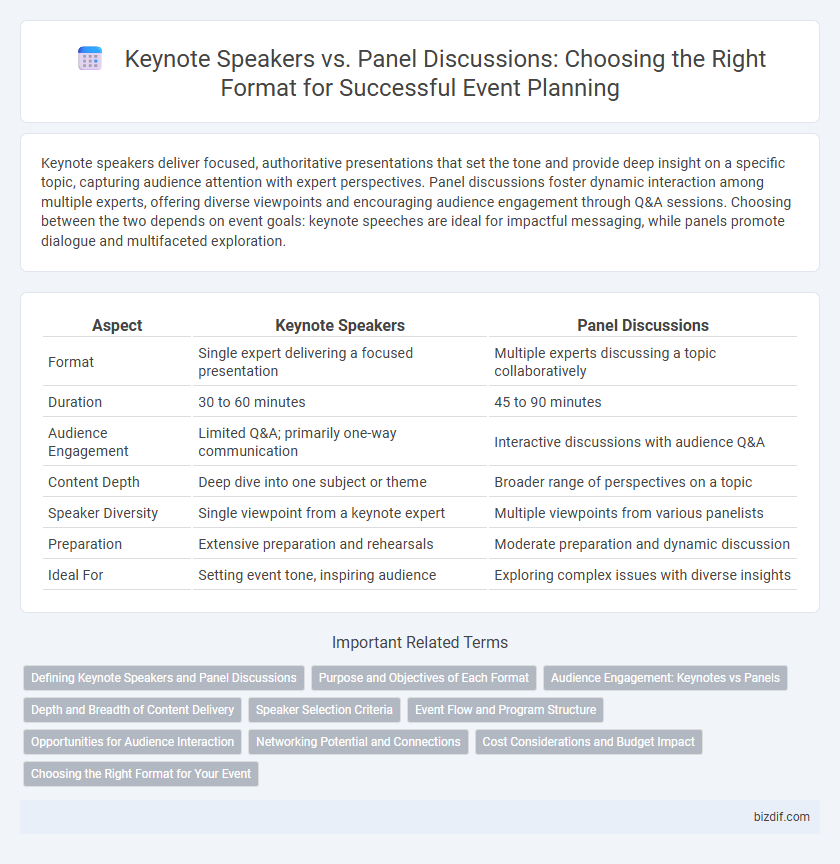Keynote speakers deliver focused, authoritative presentations that set the tone and provide deep insight on a specific topic, capturing audience attention with expert perspectives. Panel discussions foster dynamic interaction among multiple experts, offering diverse viewpoints and encouraging audience engagement through Q&A sessions. Choosing between the two depends on event goals: keynote speeches are ideal for impactful messaging, while panels promote dialogue and multifaceted exploration.
Table of Comparison
| Aspect | Keynote Speakers | Panel Discussions |
|---|---|---|
| Format | Single expert delivering a focused presentation | Multiple experts discussing a topic collaboratively |
| Duration | 30 to 60 minutes | 45 to 90 minutes |
| Audience Engagement | Limited Q&A; primarily one-way communication | Interactive discussions with audience Q&A |
| Content Depth | Deep dive into one subject or theme | Broader range of perspectives on a topic |
| Speaker Diversity | Single viewpoint from a keynote expert | Multiple viewpoints from various panelists |
| Preparation | Extensive preparation and rehearsals | Moderate preparation and dynamic discussion |
| Ideal For | Setting event tone, inspiring audience | Exploring complex issues with diverse insights |
Defining Keynote Speakers and Panel Discussions
Keynote speakers deliver impactful presentations that set the tone and highlight central themes for events, often featuring industry leaders or subject matter experts. Panel discussions involve multiple experts engaging in interactive dialogue, providing diverse perspectives and fostering audience engagement through Q&A sessions. Both formats serve distinct purposes: keynotes drive focused messaging, while panels encourage dynamic conversations and in-depth exploration of topics.
Purpose and Objectives of Each Format
Keynote speakers deliver focused, authoritative presentations designed to inspire and provide expert insights on a central theme, often setting the tone for the entire event. Panel discussions facilitate dynamic exchanges among multiple experts, aiming to explore diverse perspectives, encourage audience engagement, and foster interactive learning. Selecting between keynote speeches and panels depends on whether the event's objective is to deliver a singular vision or to generate multifaceted dialogue.
Audience Engagement: Keynotes vs Panels
Keynote speakers captivate audiences with focused, inspiring narratives that establish the event's tone and emphasize core themes. Panel discussions foster dynamic interaction by presenting diverse viewpoints, encouraging audience questions and real-time engagement. Selecting between keynotes and panels depends on desired engagement depth, with keynotes offering impactful storytelling and panels promoting collaborative dialogue.
Depth and Breadth of Content Delivery
Keynote speakers deliver in-depth expertise on a specific topic, providing focused insights and authoritative perspectives that shape the event's theme. Panel discussions offer a broader range of viewpoints by featuring multiple experts, fostering dynamic exchanges that cover diverse aspects of the subject matter. The choice between the two depends on whether an event prioritizes deep, concentrated knowledge or a wide spectrum of ideas and interactive dialogue.
Speaker Selection Criteria
Effective event planning requires careful speaker selection criteria, weighing keynote speakers' ability to deliver impactful, focused messages against panel discussions' capacity to provide diverse perspectives and dynamic interaction. Keynote speakers are chosen for their expertise, reputation, and ability to engage large audiences with a compelling narrative. Panelists are selected based on subject matter knowledge, complementary viewpoints, and communication skills to foster meaningful dialogue.
Event Flow and Program Structure
Keynote speakers anchor the event flow by delivering focused, impactful messages that set the tone and provide a clear thematic direction. Panel discussions enrich program structure through dynamic interactions and diverse perspectives, encouraging audience engagement and deeper exploration of topics. Balancing keynote speeches with panel sessions optimizes pacing, maintains interest, and enhances overall content delivery in event planning.
Opportunities for Audience Interaction
Keynote speakers provide a focused, authoritative presentation that delivers clear insights, allowing limited but impactful moments for audience Q&A. Panel discussions foster dynamic interaction by featuring multiple experts debating diverse perspectives, encouraging audience participation through live questions and real-time feedback. Choosing between the two depends on desired engagement levels, with panels offering richer opportunities for audience involvement and networking.
Networking Potential and Connections
Keynote speakers deliver focused insights that position event themes and inspire attendees, but panel discussions create dynamic environments where diverse perspectives spark interactive dialogue and stronger networking opportunities. Panel formats encourage real-time question exchanges and peer engagement, fostering deeper connections between participants and experts. Effective event planning leverages panels to maximize attendee interaction, enhancing relationship-building and collaborative potential.
Cost Considerations and Budget Impact
Keynote speakers typically command higher fees due to their prominence and exclusivity, often making them a significant portion of the event budget. Panel discussions can be more cost-effective by featuring multiple experts sharing insights, distributing speaker costs and reducing individual fees. Budget planners should weigh the impact of these choices on overall event finances, balancing speaker caliber with total expenditure to maximize value.
Choosing the Right Format for Your Event
Selecting the right format for your event hinges on understanding the impact of keynote speakers versus panel discussions. Keynote speakers offer authoritative insights and can energize audiences with focused, high-impact messages, making them ideal for setting a tone or conveying a central theme. Panel discussions foster dynamic interaction and diverse perspectives, encouraging audience engagement and deeper exploration of complex topics.
Keynote speakers vs Panel discussions Infographic

 bizdif.com
bizdif.com